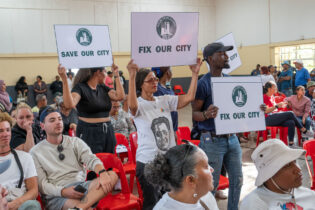Thirty-three prominent business figures from several leading South African companies last Sunday boldly called for unity among businesses to arrest a decline in confidence in South Africa’s future, warning the country could “unravel” if challenges in education, corruption and unemployment were left unresolved.
In an open letter published in City Press and the Sunday Times on the eve of the African National Congress’s (ANC’s) electoral conference in Mangaung where major policy decisions on South Africa’s economic trajectory will be made, the chairmen and CEOs offered their assistance to the government but challenged it to implement its policies and the National Development Plan (NDP). They said South Africa had “previously been able to find common ground and put ideologies aside in the spirit of national building”. The signatories called for more productive engagement with the state and civil society, and additional commitment from business to the NDP’s objectives, including that of an economy three times its present size and an unemployment rate of 6%, by 2030. The signatories included acting Lonmin CEO Simon Scott, Gold Fields CEO Nick Holland, AngloGold Ashanti CEO Mark Cutifani and newly appointed Telkom chairman Jabu Mabuza. Others were Old Mutual emerging-markets unit CE Ralph Mupita, Nedbank Group CEO Mike Brown, Investec CEO Stephen Koseff, Shell South Africa chairman and Black Management Forum president Bonang Mohale, and Business Leadership South Africa CEO Thero Setiloane. The letter calls for business to urge the government to leverage and effectively implement existing polices and visions, to rebuild confidence in labour market institutions and to promote appropriate education and skills development. It also commits them to promoting “a zero-tolerance approach to bribery, fraud, corruption and anticompetitive business practices”. Mupita told Business Day on Sunday that the letter was a spontaneous “affirmation” by several like-minded CEOs and chairmen of leading companies about the role business leaders can play to finding “real solutions to the real challenges the country faces”. Old Mutual is South Africa’s largest long-life insurer and its comments on industry issues are keenly watched by rivals. Mupita said there was an urgent need for more social cohesion and collective action to deal with the challenges facing South Africa. “The challenges are not trivial. We need government, business, labour and civic society aligned in how we tackle these challenges.” There were sections of society that believed the private sector and business leaders were not interested in playing their part in solving the challenges facing the country, yet this was not true. “The success of the companies that we lead are inextricably tied to the success of South Africa. We are very committed to that success, and finding long-lasting solutions to those same challenges,” he said.Mupita said now was the time to “galvanise” partners such as business and private capital to solve the country’s challenges and build a successful nation.
Brown said he strongly felt that there was need for collective partnership between business, the government and civil society to help South Africa reach its full potential. “We do so many of these items we commit to already in the way we manage Nedbank, but in particular I wanted to voice my full support for the National Development Plan as the 2030 vision for South Africa,” Brown said. Active business leaders have decried the state of South Africa’s leadership this year, particularly in the wake of the labour unrest that took place in the mining sector. Leslie Maasdorp, president of Bank of America Merrill Lynch for Southern Africa and vice-president at Business Leadership South Africa — and one of the signatories of the letter — previously also joined a chorus of high-profile businessman calling for stronger leadership in light of South Africa’s crises. Mr Maasdorp had said that business needed “to be repositioned to become a more active participant”, something that required a “20-year vision” rather than being driven by short-term plans. Nedbank chairman Reuel Khoza was the first high-profile businessman to publicly question the direction of the country’s leadership in March, when he wrote in Nedbank’s annual report this year of a “strange breed” of leaders in the country who were undermining South Africa’s democratic institutions. Former JSE CEO Russell Loubser also criticised the lack of leadership in South Africa in a lecture at Wits University in October. In a reference to Marikana and subsequent strikes he said “many of these issues and problems could have been avoided if only we had leadership in South Africa”. The ANC will resolve numerous economic policy issues at its elective congress next week. Business will be keen to lobby delegates in the hope of achieving some effect on the outcomes of the ANC’s policy decisions. The ANC’s national executive committee’s subcommittee on policy will this week be interacting with the media on the focus of the party’s various policy units ahead of Mangaung. The National Development Plan, along with other documents, will form part of the input for a discussion among the 4 500 delegates. Source: BDLive





